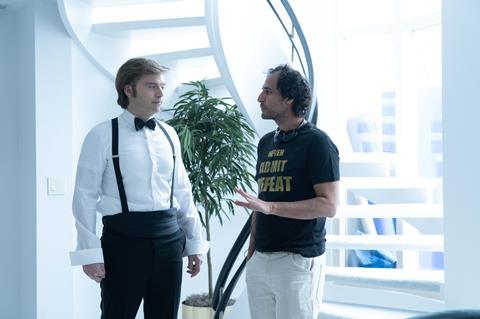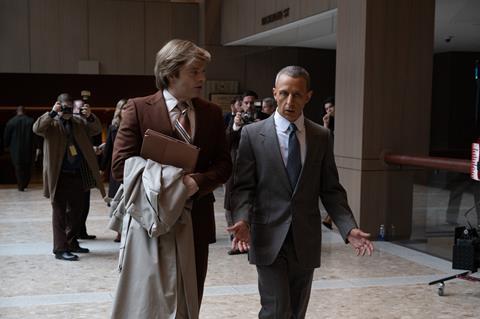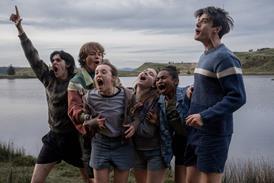
It was late summer 2018 when Ali Abbasi was first approached to direct The Apprentice. The Iranian-Danish filmmaker had just won a hard-fought battle to enter the US in spite of a travel ban imposed by Donald Trump’s administration and thought, “First, this guy makes my life difficult, and now I’m going to make a movie about him.”
Abbasi was attending Telluride and Toronto film festivals to promote his Cannes Un Certain Regard winner Border. “It was like a big political thing to get me in,” recalls the Copenhagen-based writer and director. “People from Congress had to vouch for me and say I was not a terrorist, which is funny because anyone who knows me knows that there’s not one single thing I agree on with the Iranian government.”
By that time Gabriel Sherman, a veteran political reporter who had covered Trump’s 2016 election campaign for Vanity Fair, had turned in his first draft of The Apprentice for Amy Baer, the producer of such films as Jerry And Marge Go Large and Mary Shelley. Since meeting Sherman in 2017, she shared his conviction that the crux of the film was Trump’s formative relationship with Roy Cohn, the hard-charging attorney who had been chief counsel during senator Joseph McCarthy’s anti-communist hearings in the 1950s.
“I thought this was an angle on this person that nobody really knows,” says Baer when Screen International speaks to her in October, months after the awards hopeful’s polarising world premiere in Cannes — and several weeks before Trump would defeat vice president Kamala Harris in the US election, paving the way for his return to the White House in January 2025. “Gabe and I were both trying to process what had happened in the [2016] election — what was it about Trump the candidate that appealed to such a large portion of our country.”
Abbasi was also intrigued. After Border he had received many offers to make fantasy films, but he was looking for something else and resolved that if he were to make an American film it should be about America. “As someone who grew up in [Iran], you have this very long shadow of American foreign policy hanging over you, which is not contingent on a Democratic president or Republican president — as a Middle Eastern, you would get the short end of the stick no matter what. I thought it would be intriguing to bring that outside perspective to a movie about America.”
Inevitably, the impish gods of independent filmmaking flexed. Abbasi was developing The Apprentice at the same time as Holy Spider and had intended to make it first. Yet despite interest from actors, the jigsaw of talent attachments and financing did not come together in time, so The Apprentice would have to wait.
Then Trump lost his re-election bid to Joe Biden in November 2020. “The first real impediment that stalled us was January 6,” says Baer, referring to the infamous storming of the Capitol by Trump supporters two weeks before Biden’s 2021 inauguration, after their man had refused to concede defeat. “That’s when the project became a non-starter for most people. I understood it. I couldn’t defend making the movie in that moment, either.”
Time for action
Abbasi shot Holy Spider during the pandemic and then in late 2021, with Sebastian Stan on board as Trump, The Apprentice began to gather steam. “We thought we could probably get this made now,” recalls Baer. “And the reality was, at that moment, we were assuming [Trump] was never running again. It felt like it was even more timely to look back at this individual and tell the story.”
Baer quietly took the script and talent attachments to Cannes with Rocket Science in 2022 and they pre-sold international territories — including the UK, France, Germany and Japan — with Stan and another actor cast as Cohn. It helped that Abbasi was on the Croisette with Holy Spider in Competition.
Towards the end of that year the original gap financier fell out, so in 2023 Baer returned to Cannes and secured the services of Kinematics. When the Hollywood actors strike began in July, Baer rescheduled production for Toronto and secured a SAG-AFTRA interim agreement permitting production of independent films during the strike. The original actor cast to play Cohn fell out, and Succession star Jeremy Strong signed on eight weeks prior to production. The pre-sold international territories stayed on board.
Principal photography lasted around 30 days from late November 2023 to January 2024 and, all things considered, went like a dream. “We were on schedule, on budget,” says Baer. “It was a very good shoot.”
For Abbasi, The Apprentice is a story of transformation. Like Sherman and Baer, politics was the last thing on his mind. “Gabe is an expert on the American Right,” says Abbasi, “but that’s not what the movie’s about. The script had a genuine interest in Trump as a human being.”
Would he have shot the film were Trump no longer politically active? “One hundred percent. This is not a Trump biopic or the story of Trump the politician,” says the filmmaker. “Our story basically ends where Trump the politician starts. The story is more about the transformation he goes through. One of my inspirations early on was Stanley Kubrick’s Barry Lyndon. Barry’s trajectory in Barry Lyndon is very similar to that of young Donald. He’s an ascender.”
Abbasi says Trump was an anti-establishment figure who became establishment. “Roy Cohn, Ivana Trump, same thing,” he opines. “As colourful as these people were, there is humanity there.” Abbasi imbues the story with a punk-rock essence, harnessing cinematographer Kasper Tuxen’s restless 16mm camerawork and an electronic-fuelled soundtrack to propel a whistle-stop tour of Trump’s early rise from downtrodden son of real-estate mogul Fred Trump to Cohn protégé, all set against the backdrop of high society and chicanery in 1970s and 1980s New York.
Along the way, Trump studies his mentor’s mannerisms and disdainful world view, glides through an orgy, and meets Czech model Ivana Zelnickova, whom he would marry in 1977.
Fast forward to May of this year and The Apprentice premiered in Competition in Cannes. Hailed as an indie gem in some quarters and a chintzy glob of costume jewellery in others, what is beyond doubt was the film’s impact. Up and down the Croisette, everybody was talking about Stan and Strong.
The scene where Trump rapes Ivana, played by Maria Bakalova, on the floor of their apartment, also became a major talking point. “When we shot it,” says Abbasi, “we didn’t say, ‘This is going to be the rape scene.’ This is a rupture in the relationship, this is actually heartbreaking and tragic more than being controversial. The Trumps were the ‘It’ couple of the ’80s. Donald’s relationship to Ivana was antithetical to everything that we say about him today. Ivana was strong, independent, she got a lot of leeway, she was sort of running his business. So to go from that to this rupture and him sexually assaulting her is tragic — and that is the point.”
Baer calls the sequence “an assault scene”, adding that it is “an accurate depiction of something that [Ivana, who died in 2022] testified to under oath on penalty of perjury”. Ivana initially referred to the incident as rape, noting years later that she did not want her words to be interpreted in a literal or criminal sense.
“Everybody felt that this was an important component in telling the story,” continues Baer, “because it is significant in terms of a turning point in the character. We had intimacy coordinators, we had stunt coordinators. Ali was mindful to ensure both actors felt safe.”
Fighting back

Several days after the Cannes premiere, Trump’s campaign team threatened legal action and subsequently sent the production a cease-and-desist letter in a bid to block distribution. To this day, they have not got back in touch with the filmmakers. At the same time, a ruckus blew up, mostly over the rape scene, between the filmmakers and Kinematics, the financier run by veteran agent Emanuel Nuñez and Mark Rapaport, son-in-law to billionaire and former Washington Commanders football team owner Dan Snyder.
Abbasi says he and Rapaport had disagreed over the rape scene. Stories vary as to what precisely went on in the background and to what extent Snyder, purportedly a Trump donor, was involved. “All I will say is [Snyder, who backs Kinematics] watched the movie,” says Baer. “He didn’t agree with some of the creative choices on it… But everyone on the filmmaking team is very grateful for their participation because they got the movie made.”
In stark contrast to all the noisy legal threats and internal strife, the US buyers were silent. A film that Rocket Science had licensed around the world could not stir domestic buyers in Cannes, some of whom privately conceded to Baer that they liked The Apprentice.
“I don’t have any issue with a buyer passing on a movie because it’s not for them,” says the producer. “But there was a very palpable, silent stepping away, and that was so disheartening.”
Briarcliff Entertainment founder and CEO Tom Ortenberg was on set producing the upcoming drama Nickels during Cannes, and watched a link on the recommendation of his team. He made an offer, but deal-making was put on hold while the production and Kinematics resolved their differences. In late August, executive producer and Rich Spirit founder James Shani bought out the Kinematics stake, reportedly for $5m plus a $2m sweetener.
Ortenberg closed the acquisition of US rights on August 29 and knew he had little time. He worked with Telluride Film Festival to set up the North American premiere to a packed house two days later, arranged an invite-only screening in Toronto, and scheduled an October 11 US release date of a new cut (mostly technical changes), less than four weeks before the US election and around the time The Apprentice would open in territories including the UK and France.
“I’ve made a fair amount of my reputation over the last few decades making and distributing films that were considered too controversial by some,” says Ortenberg, who in his time at Lionsgate and Open Road has overseen box-office smash Fahrenheit 9/11 and best picture Oscar winner Spotlight. “I don’t go out seeking controversy, but I certainly don’t shy away from it.”
Riding the wave
The advertising campaign was targeted at digital and social platforms. “We tried to buy a TV ad on both the presidential debate on September 10 and on the vice presidential debate on October 1, but we were rejected by ABC and CBS,” notes Ortenberg. “I do not understand and I do not approve of censorship… I don’t think most Americans approve of that.”
With barely six weeks from acquisition to release, and boosted by a crowd-funded marketing spend courtesy of a Kickstarter campaign, getting word out to the general public was always going to be a tall order. The Apprentice opened in just under 1,800 theatres to $1.6m, rising to $3.9m and counting after five weekends. Robust international box-office totalling $12m includes $2.8m for Studiocanal in the UK and Ireland, and $2.1m apiece for Metropolitan in France and Nordisk in Scandinavia.
“The Apprentice is a brilliant character study and fits into my personal vision of what I’ve always tried to accomplish in film,” says Ortenberg, “which is looking for provocative, informative, broadly entertaining films, movies that affect people, that challenge. The fact nobody else in Hollywood was willing to distribute the movie only made it more important that we stand up and do it.”
























No comments yet